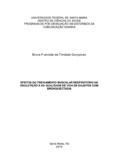| dc.creator | Gonçalves, Bruna Franciele da Trindade | |
| dc.date.accessioned | 2021-07-12T11:10:58Z | |
| dc.date.available | 2021-07-12T11:10:58Z | |
| dc.date.issued | 2019-03-29 | |
| dc.identifier.uri | http://repositorio.ufsm.br/handle/1/21394 | |
| dc.description.abstract | Introduction: Bronchiectasis is characterized by the abnormal and irreversible dilation of one or more segments of the bronchial tree by the destruction of the elastic and muscular components of its walls. Over time, it can affect important functions such as swallowing, and it is necessary to carry out adequate evaluations in order to identify changes in the biomechanics of this function for elaborate effective therapeutic proposals. Objective: to analyze the effects of inspiratory muscle training on swallowing and quality of life related to swallowing of patients diagnosed with bronchiectasis. Method: unblinded clinical trial. Participants underwent clinical evaluation of swallowing, quality of life assessment through the Quality of Life in Swallowing Disorders questionnaire, videofluoroscopy, manovacuometry and dyspnea scale. The sample was divided into two groups; the control group realized conventional respiratory physiotherapy through a bronchial clearance protocol and the study group associated this with inspiratory muscle training with POWERbreathe Physical therapy was performed twice a week for four weeks. Results: elavuated 11 individuals with bronchiectasis, most of them with normal swallowing (63.6%), middle-aged adults (44-64 years) (54.5%) female (72.7%). There was good agreement among the judges who analyzed the biomechanics of swallowing before and after the interventions. In both groups, maximal inspiratory pressure was higher after intervention (P = 0.007). However, the maximum inspiratory pressure was higher in the study group than in the control group (P = 0.034) after inspiratory muscle training. There was improvement in both groups in some variables, such as delay in the beginning of the pharyngeal phase and residues in valleculae, although without statistical significance, besides improvement of dyspnea after training. Observed improvement in the quality of life related to swallowing in the domains duration of feeding, frequency of symptoms and fatigue after inspiratory muscle training. Conclusion: the inspiratory muscle training did not have significant effects on the biomechanics of swallowing, although it improved the maximal inspiratory pressure and the degree of dyspnea, in addition to the improvement in the quality of life related to swallowing. | eng |
| dc.description.sponsorship | Coordenação de Aperfeiçoamento de Pessoal de Nível Superior - CAPES | por |
| dc.language | por | por |
| dc.publisher | Universidade Federal de Santa Maria | por |
| dc.rights | Attribution-NonCommercial-NoDerivatives 4.0 International | * |
| dc.rights.uri | http://creativecommons.org/licenses/by-nc-nd/4.0/ | * |
| dc.subject | Deglutição | por |
| dc.subject | Transtornos da deglutição | por |
| dc.subject | Bronquiectasia | por |
| dc.subject | Reabilitação | por |
| dc.subject | Qualidade de vida | por |
| dc.subject | Deglutition | eng |
| dc.subject | Deglutition disorders | eng |
| dc.subject | Bronchiectasis | eng |
| dc.subject | Reabilitation | eng |
| dc.subject | Quality of life | eng |
| dc.title | Efeitos do treinamento muscular respiratório na deglutição e na qualidade de vida de sujeitos com bronquiectasia | por |
| dc.title.alternative | Effects of respiratory muscle training on swallowing and quality of life of subjects with bronchiectasis | eng |
| dc.type | Tese | por |
| dc.description.resumo | Introdução: A bronquiectasia é caracterizada pela dilatação anormal e irreversível de um ou mais segmentos da árvore brônquica pela destruição dos componentes elásticos e musculares de suas paredes. Com o passar do tempo, pode afetar funções importantes como a deglutição, sendo necessário realizar avaliações adequadas a fim de identificar alterações na biomecânica dessa função para elaboração de propostas terapêuticas efetivas. Objetivo: analisar os efeitos do treinamento muscular inspiratório na função de deglutição e qualidade de vida relacionada a deglutição de pacientes com diagnóstico de bronquiectasia. Método: ensaio clínico não cegado. Os participantes realizaram avaliação clínica da deglutição, avaliação da qualidade de vida através do questionário Quality of Life in Swallowing Disorders, videofluoroscopia, manovacuometria e escala de dispneia. A amostra foi dividida em dois grupos, o grupo controle realizou fisioterapia respiratória convencional através de protocolo de desobstrução brônquica e o grupo estudo associou esse ao treinamento muscular inspiratório com POWERbreathe. A fisioterapia foi realizada duas vezes por semana durante quatro semanas. Resultados: avaliados 11 indivíduos com bronquiectasia, a maioria com deglutição normal (63,6%), adultos de meia idade (44 a 64 anos) (54,5%) do sexo feminino (72,7%). Houve boa concordância entre os juízes que analisaram a biomecânica da deglutição antes e após as intervenções. Em ambos os grupos a pressão inspiratória máxima foi maior após intervenção (P=0,007). Entretanto, a pressão inspiratória máxima foi superior no grupo estudo, em relação ao grupo controle (P=0,034) após o treinamento muscular inspiratório. Houve melhora em ambos os grupos em algumas variáveis como atraso do início da fase faríngea e resíduos em valéculas, embora sem significância estatística, além de melhora da dispneia após o treinamento. Observada melhora da qualidade de vida relacionada à deglutição nos domínios duração da alimentação, frequência dos sintomas e fadiga após treinamento muscular inspiratório. Conclusão: a realização do treinamento muscular inspiratório não gerou efeitos significativos sobre a biomecânica da deglutição, embora tenha melhorado a pressão inspiratória máxima e o grau de dispneia, além da melhora da qualidade de vida relacionada a deglutição. | por |
| dc.contributor.advisor1 | Mancopes, Renata | |
| dc.contributor.advisor1Lattes | http://lattes.cnpq.br/9897341072714640 | por |
| dc.contributor.advisor-co1 | Pereira, Marisa Bastos | |
| dc.contributor.referee1 | Pasqualoto, Adriane Schmidt | |
| dc.contributor.referee2 | Bolzan, Geovana de Paula | |
| dc.contributor.referee3 | Almeida, Sheila Tamanini de | |
| dc.creator.Lattes | http://lattes.cnpq.br/3851552009727916 | por |
| dc.publisher.country | Brasil | por |
| dc.publisher.department | Fonoaudiologia | por |
| dc.publisher.initials | UFSM | por |
| dc.publisher.program | Programa de Pós-Graduação em Distúrbios da Comunicação Humana | por |
| dc.subject.cnpq | CNPQ::CIENCIAS DA SAUDE::FONOAUDIOLOGIA | por |
| dc.publisher.unidade | Centro de Ciências da Saúde | por |



